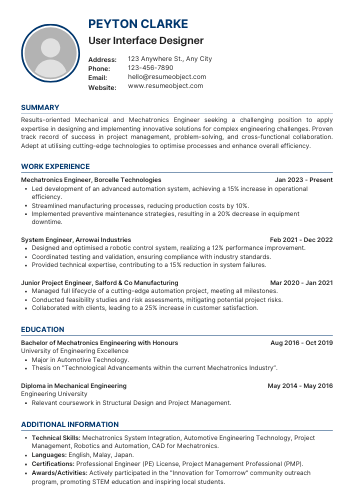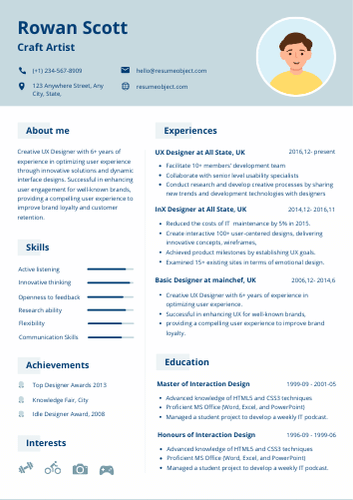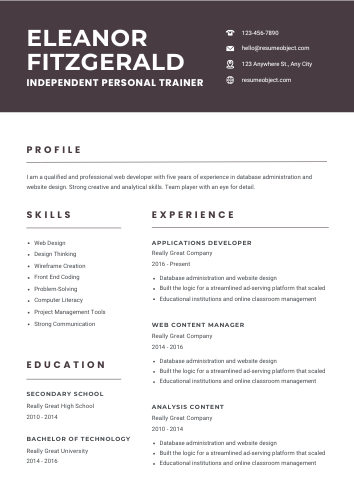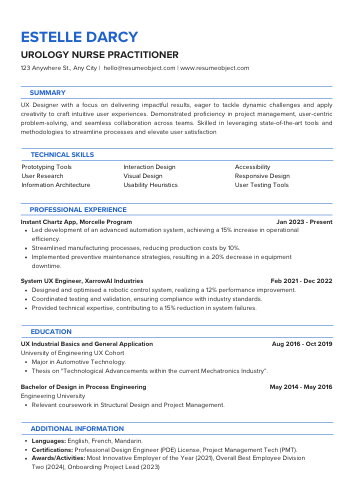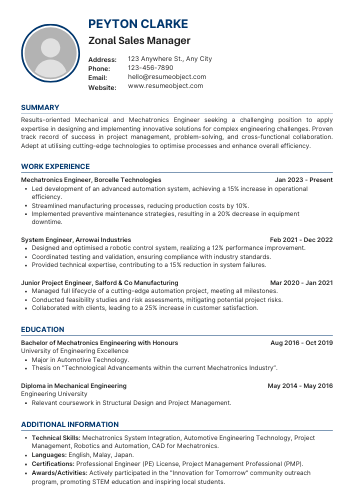27 Critical Care Nurse Skills for Resume – How to List for Critical Care Nurse Resume
Critical Care Nurse Skills on Resume
Showcase your expertise with a targeted checklist of 27 essential competencies—technical, clinical, and interpersonal—designed to elevate your candidacy. This guide reveals how to prioritize and format Critical Care Nurse Skills for Resume, translate bedside achievements into measurable impact, and craft concise bullet points that get interviews, whether you're applying for ICU, CCU, or step-down roles and secure higher-paying positions fast.
Why Critical Care Nurse Skills Matter for a Resume
Highlighting critical care nurse skills demonstrates clinical proficiency, rapid decision-making, and patient advocacy, showcasing readiness for high-acuity environments and distinguishing candidates to employers seeking reliable, skilled professionals who can manage complex cases, lead teams, and ensure optimal patient outcomes consistently.
Including Critical Care Nurse Skills for Resume is essential—employers instantly seek technical proficiency, strong clinical judgment, crisis-management abilities, and proven procedural competence. Showcasing ventilator management, hemodynamic assessment, vascular access, and advanced life support plus relevant certifications and simulation training signals readiness to provide safe, high-acuity care and adapt quickly in unstable situations.
- Ventilator and advanced airway management
- Hemodynamic monitoring and vasoactive titration
- Central line and arterial line insertion/care
- Advanced Cardiac Life Support (ACLS) proficiency
- Sepsis recognition and early intervention protocols
- Critical thinking and rapid decision-making
- Multidisciplinary collaboration and leadership
- Documentation, triage, and patient safety practices
Well-written Critical Care Nurse Skills for Resume entries translate duties into measurable outcomes—reduced code frequency, shorter ventilator days, faster sepsis bundle completion—and make impact obvious to hiring managers. Use strong action verbs, quantify improvements, include certifications (CCRN, PALS), and tailor skills to the unit’s patient population to maximize interview requests and convey immediate clinical value now and reliably.
Boost your resume with specialized techniques—explore essential culinary competencies to impress hiring managers and secure interviews: Culinary Skills for Resume for targeted roles and promotions.
Top 20 Skills for a Critical Care Nurse Resume
Critical Care Nurse Skills for Resume are essential for showcasing your expertise in high-pressure environments. Highlighting these skills can significantly enhance your job application.
- Advanced Cardiovascular Life Support (ACLS)
- Basic Life Support (BLS)
- Patient Assessment
- Critical Thinking
- Communication Skills
- Team Collaboration
- Time Management
- Intravenous (IV) Therapy
- Medication Administration
- Ventilator Management
- Patient Advocacy
- Emotional Support
- Infection Control
- Monitoring Vital Signs
- Emergency Response
- Knowledge of Medical Equipment
- Wound Care
- Family Education
- Documentation Skills
- Multitasking
Top Hard Skills for a Critical Care Nurse Resume
The following highlights the top hard skills every critical care nurse should showcase on their resume, demonstrating clinical expertise, technical proficiency, and lifesaving competencies that hiring managers prioritize for modern ICU and high-acuity complex settings.
-
Advanced Cardiac Life Support (ACLS) - Certification in managing cardiac emergencies and providing life-saving interventions.
-
Patient Assessment - Proficient in evaluating patient conditions and identifying critical changes in health status.
-
Ventilator Management - Skilled in operating and troubleshooting mechanical ventilation equipment for patients with respiratory failure.
-
Intravenous (IV) Therapy - Expertise in administering IV medications and fluids, ensuring patient safety and comfort.
-
Medication Administration - Knowledgeable in the safe administration of medications, including dosages and potential side effects.
-
Hemodynamic Monitoring - Ability to monitor and interpret vital cardiovascular parameters to assess patient stability.
-
Critical Thinking - Strong analytical skills to make quick, informed decisions in high-pressure situations.
-
Emergency Response - Trained to act swiftly in emergency situations, coordinating care and interventions effectively.
-
Patient Education - Capable of educating patients and families about care plans, procedures, and health management.
-
Wound Care Management - Expertise in assessing and treating various types of wounds, promoting healing and preventing infection.
-
Infection Control - Knowledge of protocols to prevent infections in critical care settings, ensuring patient safety.
-
Team Collaboration - Experience working in multidisciplinary teams to provide comprehensive patient care.
-
Electronic Health Records (EHR) - Proficient in using EHR systems for accurate documentation and patient information management.
-
Palliative Care - Skills in providing compassionate care and support for patients with serious illnesses and their families.
-
Family Support and Counseling - Ability to provide emotional support and counseling to patients and families during critical situations.
Other Skills for Resumes
Top Soft Skills for a Critical Care Nurse Resume
Following are the top soft skills essential for critical care nurses, highlighting interpersonal strengths, emotional resilience, communication, teamwork, adaptability, leadership abilities that employers seek to ensure patient safety, effective collaboration, and excellence under pressure.
-
Communication Skills: Essential for effectively conveying patient information and collaborating with medical teams.
-
Emotional Intelligence: Helps in understanding and managing emotions, leading to better patient care and team dynamics.
-
Problem-Solving Skills: Critical for quickly identifying issues and implementing effective solutions in high-pressure situations.
-
Teamwork: Vital for working collaboratively with other healthcare professionals to ensure comprehensive patient care.
-
Adaptability: Enables nurses to adjust to rapidly changing environments and patient needs in critical care settings.
-
Time Management: Important for prioritizing tasks and managing multiple patients efficiently in a fast-paced environment.
-
Attention to Detail: Crucial for monitoring patient conditions and administering medications accurately to avoid errors.
-
Compassion: Helps in providing empathetic care, enhancing patient comfort and trust during critical times.
-
Leadership Skills: Necessary for guiding junior staff and making decisive choices during emergencies.
-
Stress Management: Essential for maintaining composure and effectiveness in high-stress situations typical in critical care nursing.
How to List Critical Care Nurse Skills on a Resume
Discover practical guidance on How to list skills that showcase clinical expertise, leadership, and patient-focused care, plus tailored tips highlighting Critical Care Nurse Skills for Resume to attract hiring managers and pass applicant tracking systems.
When crafting your resume, showcasing your Critical Care Nurse skills is essential to stand out in a competitive job market. Focus on highlighting both technical and soft skills that are crucial for success in critical care settings. Use clear, concise language and tailor your skills to match the job description.
Consider including the following Critical Care Nurse skills for resume:
- Advanced cardiovascular life support (ACLS) certification
- Proficient in ventilator management
- Strong assessment and critical thinking abilities
- Expertise in administering medications and IV therapy
- Excellent communication and interpersonal skills
- Ability to work under pressure in high-stress environments
- Knowledge of electronic health records (EHR) systems
- Team collaboration and leadership experience
By emphasizing these skills, you'll demonstrate your qualifications and readiness for the challenges of a critical care nursing role.
Resume Example for Critical Care Nurse with Skills Highlighted
Discover an example designed to showcase essential skills and qualifications, providing a clear guide for crafting a sample resume that effectively represents a critical care nurse’s expertise and professional strengths in a competitive job market.
[Your Name]
[Your Address]
[City, State, Zip]
[Your Phone Number]
[Your Email Address]
Objective
Compassionate and dedicated Critical Care Nurse with over [X years] of experience in high-pressure environments. Seeking to leverage extensive knowledge of critical care procedures and patient management to provide exceptional care at [Hospital/Organization Name].
Education
Bachelor of Science in Nursing
[University Name], [City, State]
[Month, Year] - [Month, Year]
Certifications
- Certified Critical Care Nurse (CCRN)
- Basic Life Support (BLS)
- Advanced Cardiovascular Life Support (ACLS)
Professional Experience
Critical Care Nurse
[Current or Most Recent Employer], [City, State]
[Month, Year] - Present
- Provide comprehensive care for critically ill patients in the ICU, demonstrating strong Critical Care Nurse Skills for Resume such as advanced monitoring and assessment.
- Collaborate with interdisciplinary teams to develop and implement individualized care plans, ensuring optimal patient outcomes.
- Utilize advanced technology and equipment to monitor vital signs and administer medications, showcasing proficiency in critical care protocols.
- Educate patients and families on treatment plans, medications, and post-discharge care, enhancing patient understanding and satisfaction.
Registered Nurse
[Previous Employer], [City, State]
[Month, Year] - [Month, Year]
- Delivered high-quality nursing care in a fast-paced environment, applying Critical Care Nurse Skills for Resume including critical thinking and problem-solving.
- Assisted in emergency situations, providing life-saving interventions and support.
- Maintained accurate patient records and documentation, ensuring compliance with healthcare regulations.
Skills
- Advanced patient assessment and monitoring
- Knowledge of critical care protocols and procedures
- Strong communication and interpersonal skills
- Ability to work effectively under pressure
- Proficient in electronic health records (EHR)
Professional Affiliations
- American Association of Critical-Care Nurses (AACN)
- [Any other relevant organizations]
References
Available upon request.
Action Verbs to Pair with Critical Care Nurse Skills
Action Verbs to Pair with Critical Care Nurse Skills on a Resume help candidates showcase leadership, assessment, and rapid decision-making. Include Action Verbs to Pair with skills that align with Critical Care Nurse responsibilities effectively.
- Administered
- Assessed
- Collaborated
- Coordinated
- Delivered
- Educated
- Evaluated
- Implemented
- Monitored
- Performed
- Researched
- Responded
- Supported
- Trained
- Utilized
Common Mistakes to Avoid When Listing Critical Care Nurse Skills
Mistakes to avoid while adding Critical Care Nurse Skills on a Resume: concise examples show better impact; follow this checklist highlighting mistakes to avoid while adding skills and tailoring Critical Care Nurse Skills for Resume
When crafting a resume for a Critical Care Nurse position, it's essential to showcase your Critical Care Nurse skills effectively. However, many candidates make common mistakes that can hinder their chances of landing an interview. To stand out, avoid these pitfalls and ensure your skills are presented in the best light.
- Overloading with Generic Skills: Listing vague skills like "team player" without context can dilute your impact. Focus on specific critical care skills instead.
- Neglecting Soft Skills: Critical care isn't just about technical abilities. Failing to highlight essential soft skills like communication and empathy can be a missed opportunity.
- Using Jargon Without Explanation: While industry terminology is important, overusing jargon without clarification can confuse hiring managers who may not be familiar with every term.
- Ignoring Quantifiable Achievements: Simply listing skills without demonstrating how you've applied them in practice misses the chance to showcase your effectiveness.
- Not Tailoring Skills to the Job Description: Failing to align your skills with the specific requirements of the job can make your resume less relevant and impactful.
By avoiding these mistakes, you can effectively present your Critical Care Nurse skills for resume and increase your chances of securing the position you desire.
Tips for Listing Critical Care Nurse Skills on Resume
When crafting a resume as a Critical Care Nurse, highlighting your specialized skills is essential for standing out in a competitive field. Employers seek candidates who possess not only clinical expertise but also the ability to handle high-pressure situations. By effectively showcasing your Critical Care Nurse skills for resume, you can demonstrate your readiness for the challenges of this demanding role.
Here are some best tips to include Critical Care Nurse skills for resume:
- Advanced Cardiac Life Support (ACLS) Certification: Highlight your certification to show your proficiency in emergency care.
- Patient Assessment Skills: Emphasize your ability to conduct thorough assessments to identify critical changes in patient conditions.
- Ventilator Management: Include your experience with ventilators, showcasing your technical skills in respiratory care.
- Team Collaboration: Mention your ability to work effectively within multidisciplinary teams for optimal patient outcomes.
- Crisis Management: Detail your experience in managing emergencies and making quick decisions under pressure.
By following these tips, you can create a compelling resume that reflects your qualifications as a Critical Care Nurse.
Do
Do: Optimize your resume with ICU-specific keywords - Tailor job titles and bullet points to include terms employers search for (e.g., mechanical ventilation, hemodynamic monitoring, ACLS) - Critical Care Nurse Skills for Resume.
Do: Quantify clinical impact - Use numbers to show workload and outcomes (patients/day, code saves, reduced ICU stay) to prove competence - Critical Care Nurse Skills for Resume.
Do: Highlight advanced technical skills - Call out ventilator management, arterial line placement care, vasoactive medication titration, ECMO familiarity, and advanced EHR documentation - Critical Care Nurse Skills for Resume.
Do: Showcase critical-thinking and leadership - Emphasize triage decisions, rapid assessment, interdisciplinary coordination, preceptor or charge nurse roles to demonstrate situational leadership - Critical Care Nurse Skills for Resume.
Do: Include certifications and continuing education - List ACLS, PALS (if applicable), CCRN, sepsis training, and specialty workshops with dates to show current competency - Critical Care Nurse Skills for Resume.
Don't
Don't: Use vague, generic phrases - Employers want measurable Critical Care Nurse Skills for Resume like "ACLS-certified, ventilator management, hemodynamic monitoring," not "excellent clinical skills."
Don't: Overload with responsibilities, not outcomes - Focus on impact: "reduced ventilator-associated pneumonia by 20% through protocol implementation" rather than listing routine tasks; include skills such as "infection control, quality improvement."
Don't: Neglect soft skills evidence - Don’t just claim "team player;" show it with examples and list skills like "critical thinking, conflict resolution, interdisciplinary communication."
Don't: Include irrelevant or outdated certifications - Only highlight current, role-specific credentials (e.g., "ACLS, PALS, CCRN") and skills like "advanced cardiac life support, hemodynamic interpretation."
Don't: Forget to tailor for the job - Avoid one-size-fits-all resumes; mirror keywords from the posting such as "ventilator weaning, sedation protocols, central line care" under Critical Care Nurse Skills for Resume.
FAQs about Critical Care Nurse Resume Skills
How many skills should I include on a Critical Care Nurse resume?
Include 6-8 relevant Critical Care Nurse Skills for Resume to showcase your expertise without overwhelming the reader. Focus on clinical abilities, patient care, and critical thinking to highlight your qualifications effectively.
How do I know which skills are most relevant for a Critical Care Nurse job role?
To identify the most relevant Critical Care Nurse Skills for Resume, review job descriptions, highlight essential clinical and interpersonal abilities, and tailor your skills to match employer requirements, ensuring your resume aligns with industry standards and job expectations.
How can I prove the Critical Care Nurse skills I list on my resume?
To prove Critical Care Nurse Skills for Resume, provide certifications, detailed clinical experience, specific patient care examples, and endorsements from supervisors or colleagues. Including measurable outcomes and specialized training further validates your expertise effectively.
Should I update my Critical Care Nurse skills section for each job application?
Yes, tailor your Critical Care Nurse Skills for Resume to match each job application, highlighting relevant skills and experiences that align with the specific role to increase your chances of standing out to employers.
How to list Critical Care Nurse skills on a resume?
Highlight relevant clinical expertise, patient monitoring, emergency response, and teamwork abilities. Use clear, concise bullet points showcasing certifications, technical skills, and compassionate care. Tailor your Critical Care Nurse Skills for Resume to match the job description for maximum impact.
Tags:
Critical Care Nurse, Critical Care Nurse Resume, Critical Care Nurse Resume Tips, Critical Care Nurse Skills for Resume, Critical Care Nurse Skills on Resume, How to List Critical Care Nurse Skills, Resume Hard Skills, Resume Sample Skills, Resume Skills Section Mistakes, Soft Skills for Critical Care Nurse Resume
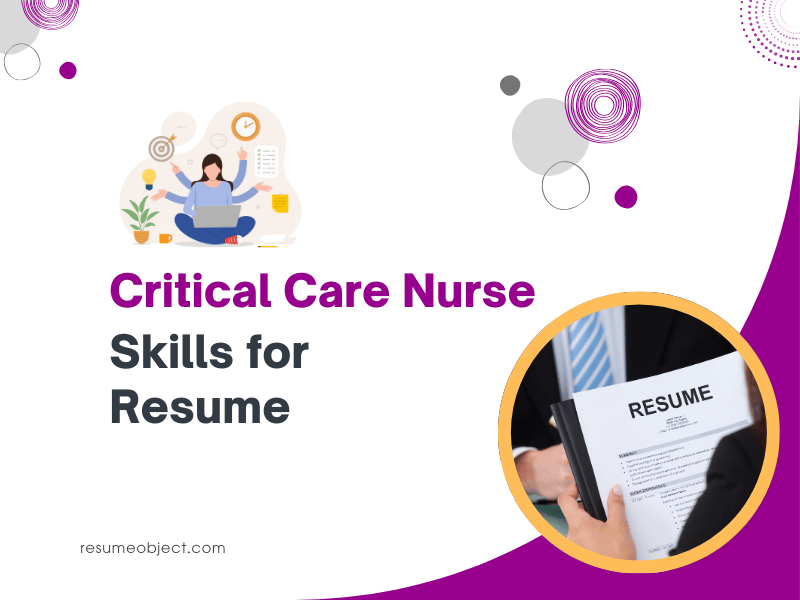
Critical Care Nurse Skills for Resume
Critical Care Nurse Skills for Resume: Discover 27 must-have skills, examples, and power verbs to showcase ICU expertise, boost interviews, and land your next role.
Top Hard Skills
Advanced Cardiac Life Support (ACLS)
Mechanical Ventilator Management
Hemodynamic Monitoring and Interpretation
Arterial and Central Line Management
Point-of-Care Ultrasound (POCUS)
Top Soft Skills
Calm under high-pressure situations
Effective interdisciplinary communication
Strong critical thinking and decision-making
Compassionate patient and family support
Adaptable to rapidly changing conditions
Mistakes to Avoid When Listing Skills
Listing vague generic skills
Overstating proficiency without evidence
Including expired or irrelevant certifications
Tips to List Skills
Highlight ICU-specific certifications
Quantify patient outcomes and interventions
Prioritize life‑saving technical proficiencies
Free Resume Templates





